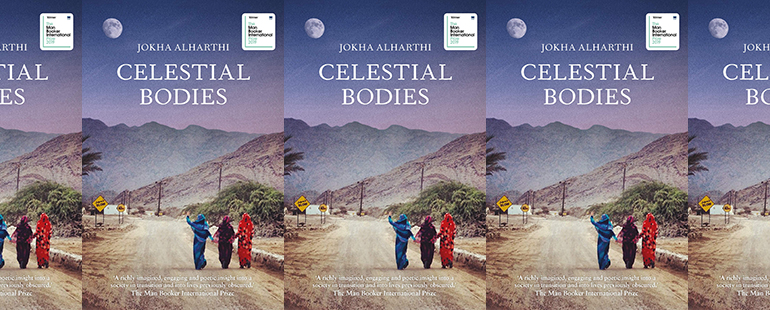Shadows of Love, Secrecy, and Ownership in Celestial Bodies

Jokha Alharthi’s Celestial Bodies, translated from the Arabic by Marilyn Booth in 2018, is the first book by an Arab author to win the Man Booker International Prize, an honor it was awarded earlier this year, and the first novel written by a woman from Oman to be translated into English. Set in a small, fictional Omani village named al-Awafi, the lyrical masterpiece spins time in an intricate portrait of a complex family web. Alharthi structures the novel around three sisters—Mayya, Asma, and Khawla—and their marriages, though the narrative is punctuated heavily by chapters from the perspective of Mayya’s husband, Abdallah; his father’s mistress and slave, Zarifa; and the mysterious Najiya, who steals the attention of the sisters’ father. While the jacket copy and the Man Booker International blurb suggest a reading of Celestial Bodies as a rather representational insight into Omani people and society, it encompasses much more than an allegorical window: Alharthi crafts a stunning rumination on love, responsibility, feminism, and freedom, as well as the unavoidably sour ramifications of the accompanying disappointment and betrayal.
In Celestial Bodies, Alharthi questions what lies behind the marriage and romance that all her characters seek to find. Love and devotion in the novel have the power to reverse the polio-induced paralysis of Najiya’s brother, whom she refuses to give up on despite doctors’ suggestions. The hidden relationship between Mayya’s father, Azzan, and Najiya, whom he calls Qamar, or Moon, “transformed his life,” “shattered his old existence into pieces,” and ultimately represents a relationship “free of artificiality, concealment, or deception.” And, yet, this same relationship later disintegrates as Azzan compares it to a form of slavery, “driven by need, binding them in irons . . . he saw this unending cycle of union and separation enveloping them, slaves to a vicious cycle of never-ending demands and doubts. . . . There’s no freedom in love, and you can’t choose—others are there, or they’re not.”
It seems almost all the romantic relationships in Celestial Bodies meet a similar crumbling: Abdallah is haunted by Mayya’s laughter when he asks her if she loves him; Asma’s initially exuberant marriage to Khalid exposes its true nature quickly after the ceremony. Khalid’s interest in Asma as a wife depends on her subordinate position to him. While Khalid “took on the likeness of a celestial sphere complete unto itself, orbiting only along its already defined path,” we learn that “what had attracted him to Asma . . . was that she fit his needs perfectly. . . . He chose accordingly, looking for a woman who would fall instantly into the orbit he had marked out, who would always be there but would also always stay just outside, yet without wanting to create her own celestial sphere, her own orbit.” This contradictory position always leaves Asma as a secondary feature, a moon perpetually trapped in the orbit that its planet forges. Through this metaphor, Alharthi presses on the poetic use of the moon to describe beautiful women, literally invoked on the page through Najiya’s pet name, Qamar: will we ever let women be more than a moon shadowing a larger, more powerful celestial body?
Alharthi couples this falsity of romantic love in marriage with the often inconvenient reality of family responsibility and guilt that loom over each moment of joy and disappointment in relationships. Mayya and Abdallah’s daughter, London, falls in love with a man who beats her and likely cheats on her, and who her mother doesn’t want her to marry. But London insists that if she doesn’t marry him, she will kill herself. In response, her friend tells her, “As far as I’m concerned what marriage is doesn’t have a lot to do with love. Love is dreams, marriage is for real: life, responsibility, children. No illusions.” This theme runs throughout the novel, where it seems that love for the characters exists only in their dreams and hopes, whereas reality turns their marriages into drudgery, riddled with betrayals. Khawla, who refuses all marriage proposals until the cousin she had been promised to in youth, Nasir, returns to Oman from Canada, waits patiently for her time of joy. Nasir has a girlfriend in Canada, however, and he only marries Khawla because his mother had made it a condition for him to receive his inheritance money after her death; he lives primarily with his Canadian girlfriend and returns to Oman every few years, impregnating Khawla and bringing back clothing for their children. Completely disconnected from his Omani family, the clothes he brings are never the right size because he doesn’t know the age of his own children. After many years, his relationship in Canada fails and he returns to Khawla in Oman, finally filling the role she had waited for all her life. Yet Khawla cannot forget the past:
Khawla did not forget anything she had gone through, day by day, hour by hour, minute by minute, everything inside her sapping her spirit. […] But she didn’t say any of it. How to say it, to a man who had spent the last ten years working himself hard to serve his home and children, how could he understand that the seed planted in those first ten years had suddenly erupted in her body, growing thorns that tore her into shreds?
With Khawla’s story, Alharthi urges us to consider what we sacrifice for responsibility. How do we weigh our own happiness against that of a family? The continual deprivation of joy the characters experience is echoed in the guilt associated with satisfaction—the shame of being seen eating even at mealtimes or of finally reaching a point of happiness in life haunts her characters, thus questioning how we measure our worth both individually and in the eyes of others.
Abdallah encounters family responsibility in even a more complex figuration: for him, responsibility to his father’s memory and to his own immediate family clash when Zarifa, his father’s slave and mistress, and Abdallah’s own caretaker as a child, dies without his knowledge. Haunted throughout the novel by the ghost of his father’s disappointment, he recalls a time when his father punished him by hanging him in a well, and feels thrust back to this moment when he hears that Zarifa has passed. He laments to Zarifa’s memory, “I am afraid, Zarifa. My father won’t forgive me for your death. . . . He’s come out of his grave, again and again, to question me about you.” He continues to list all the reasons he did not look after Zarifa, saying, “Father, I was so busy . . . I was searching for a bit of land, a house, a villa, contractors, a clinic that could help us with Muhammad’s autism, English-language institutes, accounting classes,” and the list goes on. But his plea never rescues him from his guilt: “My father did not lift me out of the well.” As our daily lives become increasingly busy, how do we spread our attention and care to all who deserve it?
Pain and guilt manifest yet again through the continual emphasis on proverbs about ignorance. Most often invoked by Zarifa when questioned by Abdallah about his mother’s sudden death, the familiar saying “Ignorance is bliss” in repeated variations is the only answer his curiosity receives. As a child, he remembers “asking one single question over and over. How did she die, Zarifa? How did my mama die?” But Zarifa never answers—until “finally, she said, Abdallah, my boy! You know what the proverb-maker says. Ignorance is bliss.” In contrast, Zarifa’s husband, Habib, who urges Zarifa to accept that she is free, mocks the bliss of forgetting, insisting on remembering the pain of enslavement. When Habib disappears, Abdallah asks her why she didn’t try to find out where he went. “She answered with her favourite line. The proverb-maker says: Knowledge means pain, not knowing keeps me sane.” Zarifa’s love of oblivion continues even in her death, of which Abdallah had no knowledge. Only after Zarifa’s death does Alharthi hint at the horrifying cause of Abdallah’s mother’s passing—after being seen engaged with a slave, her husband tells his informant, “Never mind. Leave it to me,” and she suddenly dies three months later. His own mistress, Zarifa, keeps this information from Abdallah as long as she lives. Where is the line between protecting a loved one and hurting them, between hiding truth and becoming complicit? Through Abdallah’s incessant torment of not knowing, Alharthi probes at the dangers of secrecy.
Overflowing with innately universal questions on human nature, Celestial Bodies is, however, not a book devoid of social or political context. Alharthi firmly roots the novel within the specific contemporary history of a nation that only recently outlawed slavery; it is this heavy reality that lends her motif of freedom an undeniable weight and clarity. Questions of ownership and property as they relate both to slavery and women abound in the text. London’s fiancé, when she threatens to leave him, begs her to stay, imploring, “I don’t want to lose you, and anyway, you are my property, my London. . . . You would leave me and belong to someone else?” Each of the three daughters also see their freedom enhanced once they are married—Asma looks forward to when she “would have the right to come and go, to mix freely with the older women and listen to their talk, to attend weddings . . . Marriage was her identity document, her passport to a world wider than home.” Women are often confined to the domestic sphere, whether enclosed in the household before marriage or belonging to their husbands after. Yet Azzan tells Najiya that “those poets who sang about the pleasure of possession weren’t lovers . . . They were hunters.” He continues, “A lover, Najiya, doesn’t possess the beloved. A true beloved is like you—someone who can’t be owned”—in other words, someone with whom he has a romantic relationship outside of marriage. Paired with the very recent legality of slavery in Oman, its persistence even when outlawed, and the pervasive concept of women belonging to their husbands, however, Azzan’s logic only reveals the underlying violence of marriage. Zarifa, perpetually unwilling to accept her freedom, fills both roles of slave and woman; continuously bound to Merchant Suleyman through enslavement, duty, and as his sexual partner, Zarifa’s character highlights that outlawing slavery is not enough to truly abolish systems of oppression and ownership.
Through its ever-intensifying interconnectedness and layers of secrecy, this stunningly poetic novel investigates the dark shadows of romance, responsibility, and the underbellies of our social codes and practices, urging the reader to scrutinize what is implied by our motivations and how we measure value in relationships, whether intimate, familial, or economic. As she treads the boundaries between love and betrayal, individual and community, protection and violence, Alharthi brings the reader up to face brutal truths about the way we relate to one another, refusing our tendency to look away from discomfort or complexity. Reckoning with contentious and often impossible questions, Celestial Bodies is a powerful confrontation of the unpleasant realities hiding in every corner of our lives.



